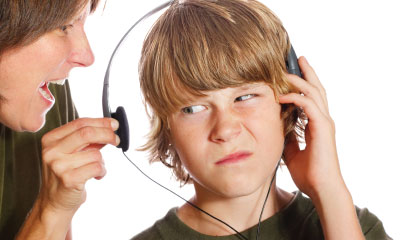 The change can seem to happen overnight.
The change can seem to happen overnight.
For Magnolia mom Megan Bond Pauli, the changes in her teen's attitude were unmistakable. She described her 15-year-old son as becoming “surly, disrespectful. He started refusing to converse with me, walking away when I was talking to him, pretending I’m invisible.”
Karen Fall of Kent began to notice a sudden coolness and rudeness from her teenage daughter. “She started having this aversion to having me anywhere near her when her friends were around. She was either flat-out ignoring me or talking to me with that tone in her voice.”
Routine household chores that were readily done in the past became contentious for Covington mom Tracy Tenney and her teenage daughter. “She would question what I was telling her to do. She’d say, ‘None of my friends have to do chores,’” Tenney says.
These moms are confronting the notorious teen “attitude.” Most parents of teens don’t escape it. But is there anything they can do about it?
The ‘tude is normal
Barbara Swenson, a Mercer Island parent educator, says the first step is recognizing that the attitude and behavior is part of a normal stage of development in which the teen is preparing to leave home. “They can’t leave the nest if the nest is too wonderful,” she says. “They have to find out everything wrong about it and tell you how wrong it is.”
But understanding this developmental stage in your teen’s life doesn’t make the rude attitude any less painful, parents agree.
Pauli realizes that overreacting just makes the bad attitude worse. She tries to appreciate the fact that the behavior stems partly from “that cargo of hormones they’re harboring. “I can distance myself from about 99 percent of it,” she says. “But every now and then, he hits the jugular.”
Pam Schilz, head counselor at Kentridge High School, says it helps for parents to focus on what might be happening in the teen’s life. “If they’ve had a bad day at school, trying to be on their best behavior, they may come home and let it all out. They know their parents are going to love them no matter what,” says Schilz, a school counselor for 28 years. “Their attitude may be more about them than it is about you. At this age, they’re really trying to figure out how to fit into a complex world.”
Get some perspective
Swenson suggests parents strengthen their connection with their spouse to help each other through this difficult phase. Some parents of teens find it comforting to call their own moms and hear that they had plenty of “attitude” of their own as teenagers.
“You need to find somebody to help you get perspective. You need to find the humor in it, find some way to see this stage of development as silly as a 2-year-old’s temper tantrums,” Swenson advises.
Seattle psychologist Ben Low, Ph.D., says trying not to take a teen's bad attitude personally doesn’t mean you're letting them get away with it. He suggests consequences only for “prosecutable offenses.” Ignore it when teens give you the evil eye, he says. “If kids say something is really lame or stupid, that’s one thing. But they’re crossing a line when they say you are so lame or you are so stupid,” he says. When you are wounded by something your teen says, Low suggests talking more about how that made you feel and less about the teen’s bad behavior.
A passing phase
Low suggests that teens show disrespect or a bad attitude to demonstrate that they’re not afraid to have an opinion of their own. They’re trying to pull themselves up to their parents’ level, but then cause conflict to create distance between themselves and their parents.
What they’re telling their parents is “‘I’m living here and I need your money, but I really want to be on my own,’” Low says. As they get older they gain increased status at school and in their social group. Eventually, the “attitude” phase will pass.
Author Anthony E. Wolf, Ph.D., agrees that the behavior will change, sometimes even before the end of high school. The title of Wolf’s book resonates with any parent of a teen with “attitude”: Get Out of My Life, But First Could You Drive Me and Cheryl to the Mall? “Though their behavior is obnoxious, terrible, should be stamped out, it is not bad,” he writes. “Teenagers are children. It is precisely because their parents have been good parents, have given them the unconditional love and support that should be all children’s due, that they can be so heedlessly obnoxious with their attitude. They will openly admit to this a few years later.”
Both Tenney and Fall say their daughters, now 18, have come to recognize how much “attitude” their parents had to put up with. “My daughter looked at me and said, ‘Oh my gosh. I was such a brat,’” Fall says. She couldn’t disagree. “I guess you have to have a pretty thick skin with teenagers.”
Freelance writer Elaine Bowers lives in Seattle with her husband and twin teenage daughters “who both have plenty of attitude.”











